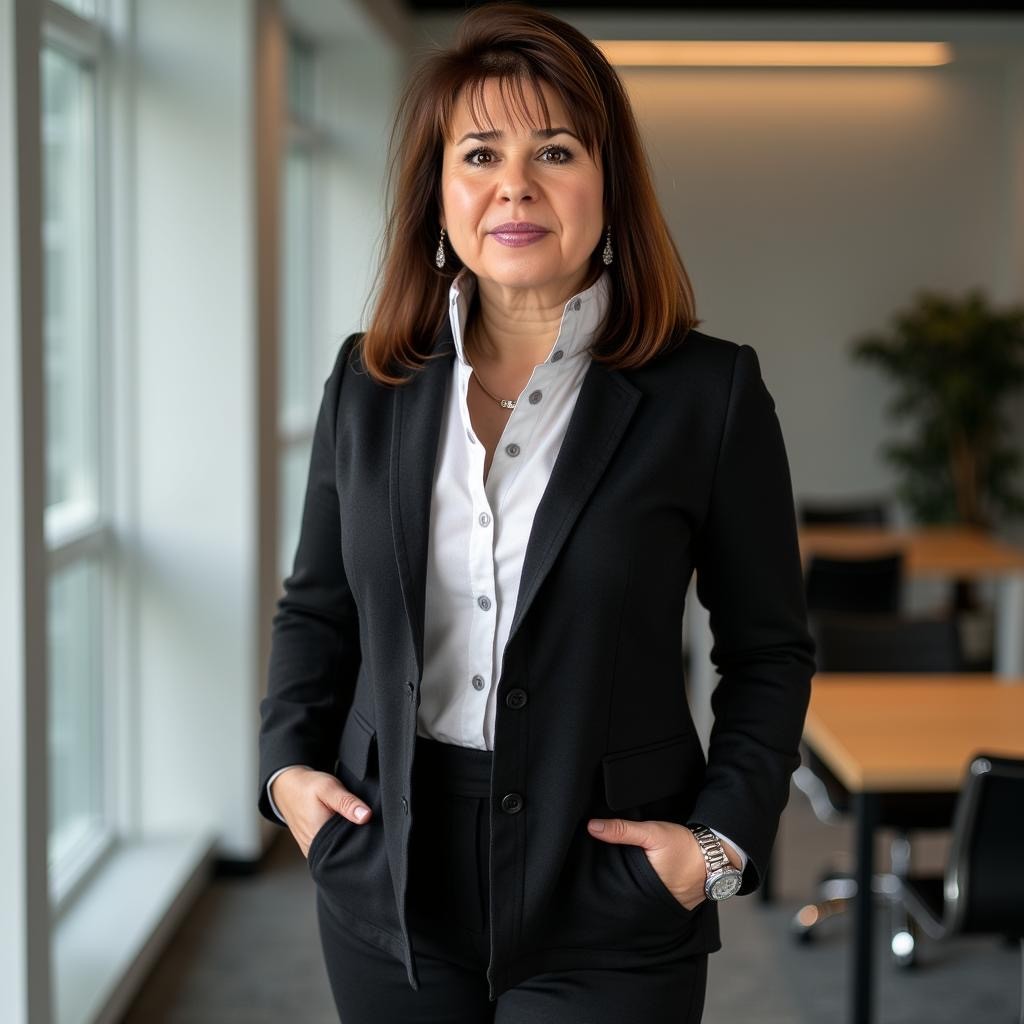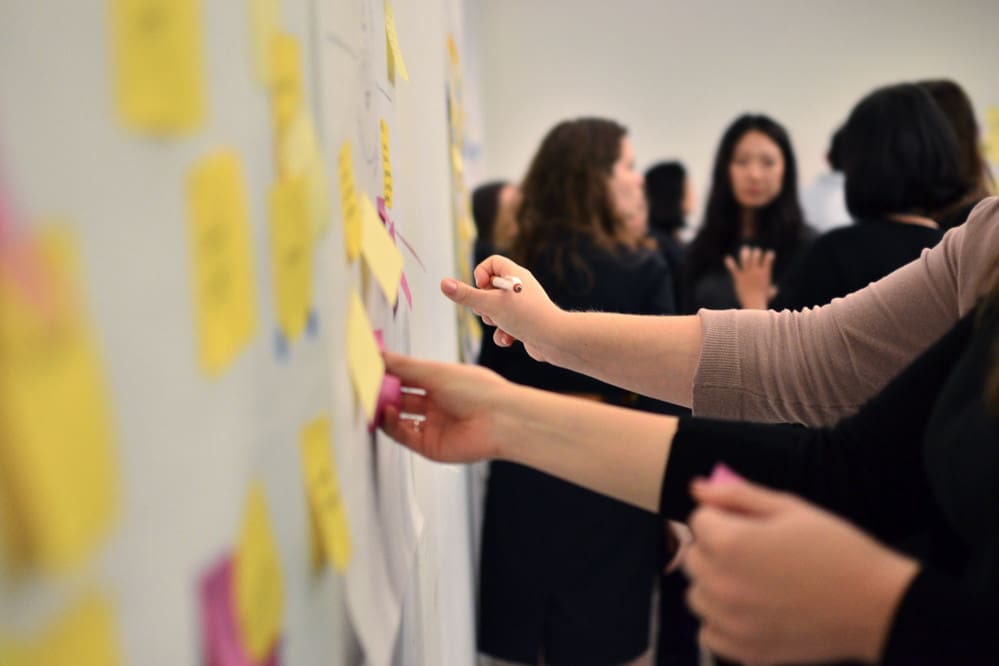
Meet the Coach: Interview with Senior Career Consultant Karen Maida Heckman
June 18, 2025 Written by Cynthia Orduña

Compare Providers
Download our outplacement comparison sheet
Request Pricing
Compare our rates to other providers
With over 20 years in the corporate sector across consumer-packaged goods, finance, sales, human resources, and retail, Careerminds Senior Career Consultant Karen Maida Heckman specializes in outplacement coaching and interview prep.
Having personally faced layoffs and transitions in her own career, Karen brings a deep understanding and empathetic, strategic approach to career coaching. As a certified coach and certified MBTI (Myers-Briggs Type Indicator) practitioner, she helps professionals at all levels navigate their transition to refine their personal brand and master the job search process with confidence.
In this conversation, Karen shares her approach to career coaching, her advice for anxious job seekers, and her experience in the outplacement industry.
1. What Does Your Role Entail as a Career Coach at Careerminds?
I guide individuals—referred to as participants—as they navigate their career transitions. While some arrive with a clear vision for their next step, many are managing unexpected changes as a result of a layoff or reduction in force (RIF).
Whether they know exactly what they want or are exploring new paths, my role is to help them get where they want to go. That might mean helping someone pivot to a new industry or stay within their current field. I use my experience, resources, and coaching tools to support them throughout that process.
I spent over two decades in corporate America, primarily in human resources, with much of my time focused on learning and development. Most of that time was at Mars Incorporated, the company behind M&Ms and Snickers. I was part of the sales organization, responsible for onboarding and training the US sales force in the confectionery division.
While there, people across the organization would come to me for advice on transitioning into sales roles. I would help them map out what they needed to do—what education, skills, or competencies were required. Even back then, I was helping people assess what skills they already had and what they needed to develop to reach their goals.
Coaching just became a more formal extension of that work. After experiencing a few unplanned transitions myself, I decided to officially pursue coaching and earned my coaching certification.
3. How Has Your Past Experience Influenced How You Coach Today?
It is all deeply connected. Whether it’s job searching, leadership development, or career exploration, we are always learning and growing. My corporate experience helps me guide people toward clarity by figuring out what’s important to them, identifying their strengths, and using what’s already in their “toolbox” to move forward.
I often help clients make connections they didn’t see before, like how their skills can transfer into a new career path. That kind of support is invaluable when someone feels stuck or uncertain.
4. Was There a Specific Moment or Experience That Helped You Realize Career Coaching Was Your Passion?
That is a great question. When I first started coaching, I didn’t know what my niche would be. I just knew I wanted to help people find clarity and purpose. Once I joined Careerminds a little over three years ago, I found myself diving deeper into the career coaching space and helping people really assess where they are, what skills they have, where they want to go, and how to get there.
What truly resonated for me was working with clients who had been with the same organization for 10, 20, even 30+ years, only to be suddenly laid off. Many were blindsided. When so much of your identity is tied to your job, that loss can feel devastating. Being able to relate to that, having been through it myself, allows me to meet people where they are and help guide them out of that emotional fog.
5. What Is the Process Like for Someone Who’s Re-entering the Job Search After 30 Years at the Same Company?
First and foremost, coaching is relationship-based, so there has to be trust. Especially in emotionally charged transitions like these, building rapport is essential.
We start by assessing where they are emotionally. Whether someone has been with a company for 3 years or 30 years, the emotional state matters. Are they ready to do the work of job searching? Because it is work. It’s about clarity, research, and using your network to find the right direction.
For many people in this situation, they do not even know what options exist, so providing structure and resources is key.
6. How Do You Approach Clients Who Are Still Emotionally Processing a Sudden Layoff?
The emotional side of job loss is very real. While layoffs are often business decisions, they hit people personally, especially when they have put their heart and soul into their work. My job is to help them shift from an emotional reaction to a strategic mindset.
I have found that people often go through something similar to the five stages of grief, which are denial, anger, bargaining, acceptance, and depression. But once they move from their heart to their head and realize, “This wasn’t about me, it was just business,” then they can begin to move forward. That is a major hurdle, and it is deeply fulfilling for me to help someone get past that.
Need help navigating an upcoming layoff event? Click below to download our comprehensive layoff guide with step-by-step strategies to help you ensure a smooth and supportive transition for your employees.
7. What Can Individuals Expect When Working with a Careerminds Coach?
We break things down into manageable parts:
- Where are you now?
- Do you know where you want to go?
- If not, how can we explore that?
Once we have clarity on their direction, then we get to the resume. It has to align with current trends, like incorporating the right keywords from job postings for applicant tracking systems. The resume’s job is to get interviews, so we make sure that it’s doing that effectively.
But again, I meet people where they are. If someone is still emotionally raw, we will not jump into the resume writing process right away.
Sometimes, I suggest that they take some time and think about what they really want. One question I like to ask is, “What did you want to be when you grew up?” It often sparks a moment of clarity and reconnects them to something they have always wanted but never pursued.
8. What Do You Find Most Fulfilling About Working with Participants at Careerminds?
I love being able to help people see that a layoff is not the end. In the moment, it feels overwhelming, especially if someone has followed the same routine for decades. There’s often a sense of, “What do I even do now?”
I love when they discover something on their own through our conversations. Maybe it is remembering what they wanted to be as a kid, or realizing that this layoff isn’t the end of the world. Watching that light bulb moment, seeing their excitement build as their mindset shifts—that is what I love.
When I get a call from a client saying, “I got the job!”—knowing that I helped them prepare for interviews, supported them emotionally, and reminded them of their strengths—that’s incredibly satisfying. I roll up my sleeves with them, cheer them on, and help them see the light at the end of the tunnel. Some clients even say, “I’m so glad this happened. I wasn’t happy before.”
Honestly, if I had not been laid off myself, I am not sure that I would have gone this deep into career coaching. It is a full-circle moment that gives my work real purpose.
9. What Common Questions or Misunderstandings Come Up When People First Join an Outplacement Program After a Layoff?
One of the most common things I hear is confusion about what a career coach actually does, especially the difference between someone like myself and a recruiter or headhunter. Many people think I’m going to come to them with job openings saying, “Hey, I’ve got five jobs for you, let’s apply!” But that is not my role.
Instead, I am here to support them through their transition. I help them make sure that they have the right strategy, the right tools, and a strong mindset. I am their guide and their cheerleader.
Second, a lot of people do not know where to begin their job search. Some are not familiar with today’s job search boards or tools like LinkedIn. Others do not understand how recruiters or executive search firms work. Many assume that they have to pay recruiters themselves when, in reality, it is the hiring company that pays for those services.
There are a lot of “Oh wow, I had no idea” moments. People just haven’t had to think about this before, or it’s been a long time since they did.
10. How Have You Seen the Outplacement Industry Evolve Over the Past Decade?
It has evolved a lot, especially in how personal and ongoing the coaching relationship has become. At Careerminds, for example, it is not just, “Here’s your resume, good luck.” We actually get to know our clients. We assess where they are, what they need, and we partner with them throughout the process.
When I went through outplacement, it was much more limited. Earlier versions of outplacement that I experienced were mainly focused on writing your resume and handing you some generic resources. There was no ongoing coaching or emotional support. It felt very “check the box.”
Clients now regularly tell me, “I don’t want to make a move until I talk to you.” They want help reviewing job postings, editing their LinkedIn, tweaking their resume, and just having someone to bounce ideas off of. That kind of partnership unfortunately did not exist for me.
I had never experienced coaching as hands-on and genuinely invested in a client’s success as what we provide here at Careerminds. I treat every participant like they are part of my circle. I genuinely care about what happens next for them. I want to know where they are in their search, what is frustrating them, and what they need help with.
That human element is what sets us apart. We are not transactional; we are personal. I have been told by many of our clients that they have never had outplacement services like ours at Careerminds. The biggest shift has been that human element. At Careerminds, we combine the best tools with genuine, personalized coaching. We care. And clients feel that.
Are you looking for ways to empower and support your employees through challenging career transitions and reduction events? Click below to connect with our outplacement experts and see how Careerminds can help you navigate the delicate process.
11. What’s One Particularly Memorable or Defining Moment That’s Stayed with You During Your Coaching Career with Careerminds?
I worked with someone who had been at the same company for over 30 years, starting right out of college. They were devastated by the layoff, and terrified of new technology. Even working in Microsoft Word was a challenge, and interviewing felt like a mountain they couldn’t climb.
By the end of our time together, they had not only created a resume and built a network, but also landed a great job and were offered the role on the spot during an interview. Seeing that transformation, from overwhelmed to confident and employed, was incredibly rewarding.
12. How Do You Support Clients Who Feel Anxious or Uncertain, Especially As the Job Market Feels Slower?
First, we have to talk about mindset. This process can feel like a full-time job, and can be emotionally draining. I help people build their grit and resilience. We look at trends—I stay updated through the Bureau of Labor Statistics (BLS) and HR industry news—but what matters most is helping clients stay grounded and strategic.
We also problem solve together. If someone is not getting phone screens, their resume may need work. Are they customizing it for each role? Are they using the right keywords from the job posting? If they are getting interviews but not offers, then we dig into their interview performance. We will run a mock interview together and figure out what might be holding them back.
Then, because I bring an element of mindfulness into my coaching, I will also ask about stress. What is their stress level? How are they reducing it? Whether it’s journaling, going for a walk, trying meditation, or whatever brings them joy. Clearing their mind helps them stay in the right space to keep going.
Positive, definitely. You have to understand that this is going to be a process. Like anything in life, you get out of it what you put into it. You have to do the work, but that work has its rewards.
That means knowing how to sell yourself, understanding your personal brand, and being really clear on your unique value proposition. What are the tools in your toolbox? What do you bring to the table?
When you can communicate that clearly, it’s easier for someone to say, “Yes, you’re the obvious choice.”
14. What’s One Piece of Advice You Frequently Give to Individuals Going Through a Career Transition?
Two things, actually. First, treat every conversation from now on as a potential opportunity. You might be at the bus stop talking to another parent. If you’re comfortable, let them know what you need help with. They could become a networking connection, or maybe they work at a company that’s hiring.
Second, trust your gut. I tell people that when you go into an interview, you are interviewing them as much as they are interviewing you. Ask the questions you need answered about the culture, the team, and the expectations.
Then listen to your intuition. Some of the best decisions I have made came from trusting my gut, and it is something I encourage clients to practice as well.
15. What Advice Would You Give to Companies That Are Uncertain About Partnering with an Outplacement Firm?
First, I would encourage them to do their research and really put themselves in the shoes of employees about to go through a difficult transition. Think about how outplacement could add value. How can you show your employees that, even though this is a business decision, you still care? Providing these resources is a way of saying, “We want to help you succeed as you move on.”
Transparency is also important. Let employees know what support you are providing. I have had clients spend hundreds of dollars on a resume writer before our first call, because they did not realize that resume support was already included in the outplacement program. Clear communication can prevent that kind of unnecessary expense and help people feel genuinely supported.
If you are interested in learning more about our industry-leading outplacement programs, click below to speak with our experts and see if Careerminds is the right outplacement partner for your organization.
In need of outplacement assistance?
At Careerminds, we care about people first. That’s why we offer personalized talent management solutions for every level at lower costs, globally.



